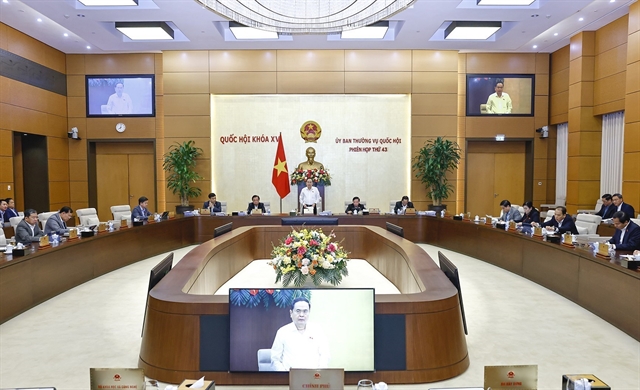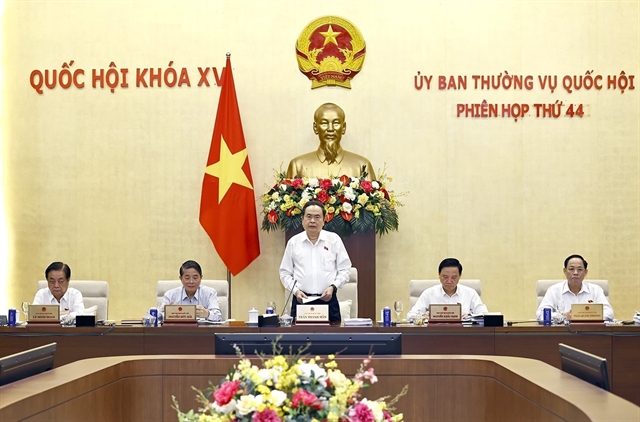 Politics & Law
Politics & Law

 |
| NA Chairman Trần Thanh Mẫn speaks at the Standing Committee's 44th session on Monday. — VNA/VNS Photo |
HÀ NỘI — The National Assembly (NA) is preparing for a constitutional amendment process, described as a 'critical and complex' task linked to the country’s ongoing efforts to streamline its political apparatus, NA Chairman Trần Thanh Mẫn said on Monday.
Speaking at the 44th session of the NA’s Standing Committee, Mẫn emphasised that the 2013 Constitution's revision would involve a vast workload and the coordination of multiple institutions. The proposed changes aimed to support a broader policy of consolidating and reorganising Việt Nam’s political structures.
The session would review proposals to amend certain articles of the 2013 Constitution, establish a drafting committee, and conduct a month-long public consultation. Mẫn stressed that this legislative agenda would mark the largest undertaking since the current term began.
According to the legislative schedule, lawmakers will deliberate and vote on 30 laws and seven resolutions, while also giving feedback on six additional draft laws. Some of these will follow the existing legislative process under the 2015 Law on Promulgation of Legal Normative Documents, while others will proceed under newly revised procedures set out in the 2025 amendment.
"Whether the responsibility lies with the Standing Committee, or proposing agencies, all stakeholders must coordinate closely and ensure high consensus before presenting drafts to the NA for approval," Mẫn said.
As Việt Nam prepares to merge provincial-level units and dissolve district-level entities, the constitutional amendments are expected to play a central role in enabling structural reforms.
Mẫn acknowledged the process would have significant implications for the governance and leadership functions of the Communist Party and the Government.
Despite the urgency, Mẫn criticised delays in submitting supporting materials, particularly for economic and fiscal matters. He urged the Government to expedite documentation and align with the session’s schedule to avoid bottlenecks.
The Standing Committee is also tasked with finalising resolutions on restructuring commune-level units and will review provincial-level merger proposals, provided the Government submits them in time.
Central authorities have endorsed a plan to reduce the number of communes nationwide by about two-thirds.
In a warning against overloading the session, Mẫn advised postponing less urgent items unrelated to institutional reform, science, or innovation. He also called on the Government to promptly issue guidance for laws already passed to ensure swift implementation.
The current session is seen as a 'final sprint' ahead of the 9th NA session. Mẫn urged agencies to finalise documents promptly after each agenda item and align with the 11th Central Committee’s resolutions to ensure timely distribution to deputies.
Citizen feedback has been actively collected through outreach efforts. Dương Thanh Bình, Head of the Standing Committee's Ombudsman Commission, reported that 2,033 public petitions were submitted, of which 96.1 per cent had received responses.
In a report in March, Bình said voters were largely supportive of the proposed administrative reforms and commended socio-economic progress in the first quarter of 2025.
However, public concerns persist over misinformation on social media about the restructuring, rising fire incidents, unauthorised medical practices and a growing measles outbreak.
Additionally, recent US tariff hikes on Vietnamese exports raised fears over employment and domestic production. Bình urged the Government to enhance communication on restructuring efforts and continue economic dialogue with the US to mitigate trade impacts.
Mẫn praised government agencies for timely responses to voter petitions ahead of the 8th session and urged further improvements in responsiveness and transparency. He called for stronger inter-agency coordination and deeper analysis of unresolved citizen concerns, including the review of outdated legal texts.
The Committee’s session will run in two phases, from now until April 17 and April 22 to 28. — VNS